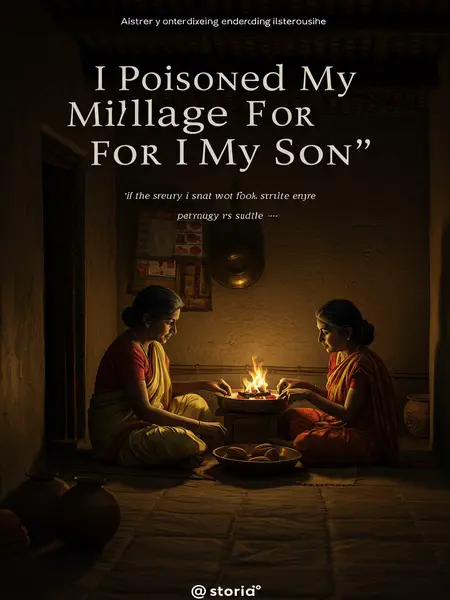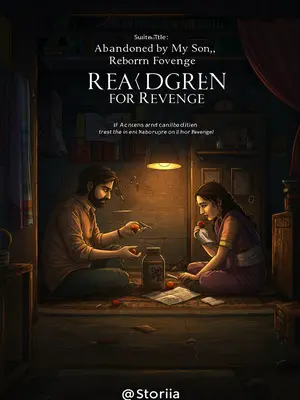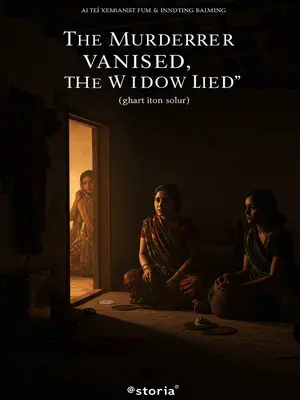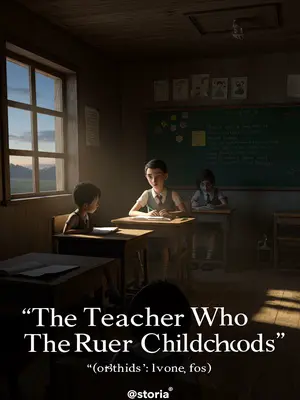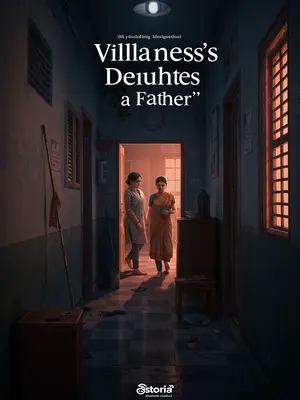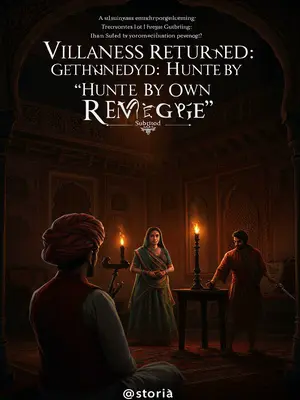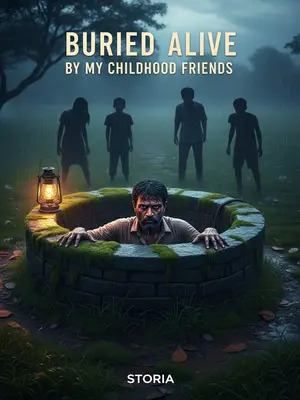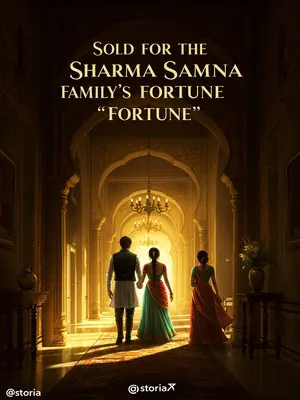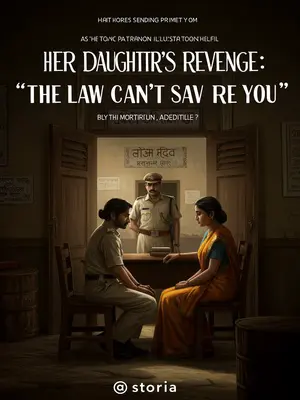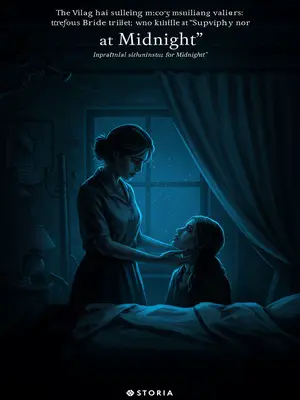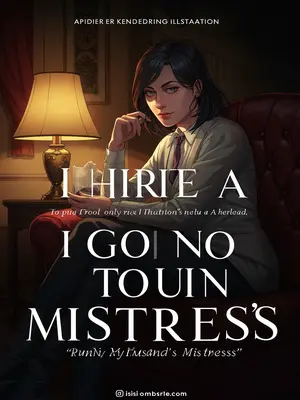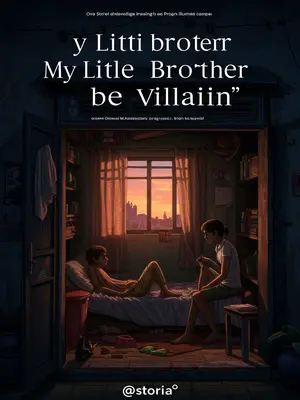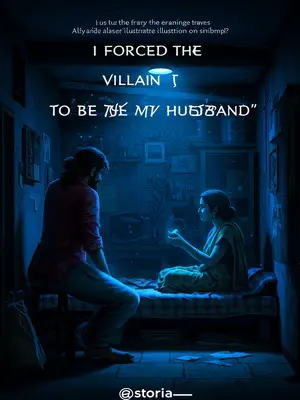Chapter 3: Public Shaming
When the interrogation room door opened again, three hours had passed.
The sun had shifted, throwing long shadows through the grilled window. I counted the stains on the wall, humming an old Bollywood tune under my breath. Every so often, someone would walk past the door and steal a glance at me—each face more curious, more wary than the last.
This time, along with the police, they brought in an old acquaintance.
My heart skipped a beat—was it Ravi, returned from the dead? Or maybe my mother, come to haunt me? But no, it was someone from my past, a figure I hadn’t seen in years.
My class teacher, Meera Ma’am.
She wore the same light blue saree with the faded border she used to wear on exam days. Her eyes were red-rimmed, the bindi on her forehead slightly askew. The faint scent of Pond’s talcum powder lingered as she entered, clutching her purse to her chest like a shield.
I thought she’d look at me with the same disgust as everyone else, but to my surprise, her first reaction on seeing me was to burst into tears.
The tears started silently, then came in choking sobs. The inspector and constable exchanged uncomfortable glances, but no one dared interrupt her grief.
"Rohan, how could you do such a thing?"
She rushed over and hugged me, sobbing so hard she could barely speak:
Her arms were thin, trembling as she drew me close. I felt her tears soak into my shirt, her bangles cold against my skin. “Mera bachcha, kahan galti ho gayi?” she kept repeating, unable to comprehend the boy she once praised in class was now accused of mass murder.
"There must be some reason, right? Good child, if you have any grievances, tell the teacher, okay? The teacher doesn’t believe you could do something like this."
Her voice broke on each word, the words tumbling out in a desperate plea. She patted my head as if I were still her prize student, not a criminal shackled to a metal chair.
Listening to her choked voice, I looked up at the imposing stranger by the door, the corners of my mouth curling in a mocking smile:
I caught the eye of the man in the dark suit—clearly not a local cop. He radiated power, the kind that made everyone else shrink back. My lips curled. “So this is your new trick, Inspector saab? Emotional blackmail?”
"What, now that everyone close to me is dead, you bring in a teacher? Since force didn’t work, you want to try the soft approach?"
I said it loudly, daring the officers to contradict me. The fans whirred overhead, and somewhere, a cell phone vibrated with a shrill film tune.
The man’s eyes were deep and unreadable. He pulled out a chair and sat down:
He moved with the quiet authority of someone who’d seen worse, who carried secrets in his eyes. His fingers drummed on the table, gold ring glinting in the dull light.
"My name is Kabir Singh, Deputy Commissioner of the Crime Branch. This case has caused too much social uproar—too heinous. From now on, I’ll be in charge of your interrogation."
His voice was calm, but there was steel underneath. The room felt smaller, airless, as if the very walls were holding their breath.
So they’d brought in the big guns.
I let out a low whistle, nodding in mock respect. “Wah, DCP saab khud aaye hain. Ab toh maza ayega.”
I turned away indifferently, flexing my wrists where the cuffs had rubbed my skin raw:
The skin was red and angry, but I didn’t show any discomfort. I kept my chin high, meeting Kabir Singh’s gaze with defiance.
"Ma’am, can you get up now?"
Meera Ma’am stiffened, then stood up with red-rimmed eyes. Kabir Singh’s pen tapped on the table, the sound sharp as a judge’s gavel:
She wiped her tears with the edge of her saree, sniffed, and slowly took a step back. Kabir Singh’s tapping was relentless, the sound echoing through the tension like a court verdict.
"Rohan, your grades are outstanding and your school record spotless. Both teachers and classmates speak highly of you."
He flipped through the file, reading out comments from old report cards. “Rohan is a model student. Always helpful, always polite.” For a moment, I saw my old self—the boy who stood first in every class, whose name was called at morning assembly.
"And your psychological evaluations show nothing abnormal—no signs of antisocial personality disorder. You say you had no motive for the crime? I don’t buy it."
Kabir Singh’s voice was low but cutting. He held up a sheaf of papers—test scores, essays, certificates—my whole life reduced to a stack of official forms.
His narrowed eyes were sharp enough to cut.
His stare made even the constable shift uncomfortably. “He’s the kind who can see through you, no matter how good your act,” I thought.
But since I could wipe out a whole village without blinking, how could I be scared by him?
I almost smiled. “Inspector saab, you’re not the first to try.”
"Aren’t you police all about evidence? If you think I’m lying, show me the proof. Anyway, I’ve said all I need to say. I’m just doing my part for society."
I kept my tone breezy, even as Kabir Singh’s gaze hardened. The constable scribbled furiously, almost tearing the paper.
"Rohan, you were perfectly fine at school. Why—"
"Enough!"
I snapped, abruptly cutting Meera Ma’am off.
My voice echoed off the walls. Meera Ma’am’s lips quivered, but she said nothing. The DCP’s pen stilled, hovering over the notepad.
"No need for you to plead for me here. Get out!"
I jerked my head towards the door, the harshness of my words slicing through the air. For a moment, she looked at me as if seeing a stranger.
She flinched at my bloodshot glare, biting her lip for a long time before leaving in tears at Kabir Singh’s nod.
Her shoulders shook as she walked away, the clack of her sandals trailing after her. I looked away, unable to meet her eyes.
Watching her retreating back, my emotions gradually settled.
A strange calmness washed over me, as if the storm inside had finally spent itself. The smell of antiseptic and sweat filled the room once more.
When I looked up, I found Kabir Singh staring at me unblinking, as if trying to read every flicker of my expression:
His gaze was steady, relentless. “You can’t fool me,” it seemed to say. For the first time, I wondered if I was out of my depth.
"A good student with no criminal record, with excellent performance, suddenly commits a massacre."
He spoke as he pulled several sheets from his folder—sketches of me from different angles during the old inspector’s interrogation.
He laid the papers out, one by one. My own face stared back at me, twisted in anger, boredom, arrogance. “Do you recognise yourself, Rohan?” he asked quietly.
"I have to admit, your psychological fortitude and anti-interrogation skills are far beyond your age."
He spoke almost admiringly, as though dissecting a chess move. The constable’s eyebrows shot up, surprised by the unexpected praise.
"But subconscious micro-expressions can’t be faked."
He jabbed a finger at one photo. “See this? Aapke chehre pe likha hai jo aap keh nahi rahe.”
"Rohan, you’re lying."
The certainty in his tone, the confidence in his eyes—he seemed to see straight through me.
For a split second, my resolve wavered. But I forced myself to laugh, brushing off his words.
But I just found it laughable.
I snorted, leaning back in my chair. “Lagta hai aapne bhi Netflix ki crime series zyada dekh li hai, sir.”
"Inspector, with people as arrogant as you in charge, is the state department really that short-staffed?"
I threw the words out like a challenge, hoping to rile him. The constable shot me a warning glance, but Kabir Singh didn’t react.
Kabir Singh didn’t rise to my sarcasm. Instead, he pressed on:
He simply waited, unflinching. The room felt heavy, the silence pressing in.
"Am I wrong?"
His voice was low, steady. He leaned forward, eyes never leaving mine.
"Fine, you guessed right."
The new constable clearly hadn’t expected me to admit it so easily and was momentarily stunned.
He stopped mid-scribble, mouth agape. Even Kabir Singh looked surprised, though he hid it well.
I glanced at the clock, then at Kabir Singh:
The ancient wall clock ticked loudly, marking the seconds like a judge’s gavel. I caught Kabir Singh’s eye, letting the tension build.
"You’re the one in charge here. If you agree to one condition, I’ll tell you the truth."
I spoke quietly, the words slipping out before I could stop them. The constable sat up straight, suddenly alert.
"A murderer like you dares to make demands? You’re out of your mind! Deputy Commissioner, who knows what trick he’s up to. Don’t agree!"
The constable all but jumped out of his chair, glaring at me as if I might leap across the table at any moment. “Sir, mat maaniye inki baat!”
Kabir Singh just raised an eyebrow and ignored the angry constable.
He waved a hand for silence, never taking his eyes off me. For a moment, the tension in the room could have snapped a rubber band.
After a moment’s thought, he looked at me:
His fingers steepled, head cocked to one side. “Let’s see where this goes,” his silence seemed to say.
"Say it. If you want a lighter sentence, forget it. That’s impossible."
He made his stance clear, voice as firm as a judge’s. “Koi chhoot nahi milegi.”
I smiled.
I let the grin spread slowly across my face, feeling a strange relief. For once, there was honesty in the air.
If I was afraid of dying, I wouldn’t have done any of this.
I almost laughed. “Zindagi ka darr hota toh itna kuch karta hi nahi, sir.”
"I don’t want a lighter sentence. I just want to go outside."
The request hung in the air, confusing everyone in the room. The constable’s mouth worked soundlessly, as if the words made no sense at all.
I told Kabir Singh I wanted to see the tallest tower in Lucknow.
I’d heard about it all my life—the pride of the city, the place where dreams touched the sky. To the villagers, Lucknow was a distant fairy tale, a city of nawabs and lights. I wanted to see it once, just once, before the end.
They debated for two hours before finally agreeing.
Arguments erupted in hushed tones outside the room. Some said it was madness, others that it would look humane in the papers. In the end, Kabir Singh’s word was final. “Let him have this,” he said. “What harm can it do?”
Even though I was handcuffed, for a brief moment I was free.
The city air smelled different—richer, thicker, tinged with exhaust and the scent of roasting bhuttas. For a second, I forgot about the cuffs, the police, the hatred swirling around me. The sun felt warm on my face, the traffic a dull roar in my ears.
But as soon as I left the police station, something happened that no one expected.
A crowd had gathered outside, seething with rage. The moment they saw me, they looked ready to tear me apart.
People pressed against the barricades, shouting, waving placards with my name scrawled in angry red paint. Women in bright salwar suits clutched their dupattas, shouting curses. A group of college boys jeered, while old men shook their sticks, faces twisted with fury.
"Everyone, look! That ungrateful wretch is out!"
A voice rang out above the din—a paan-stained yell that cut through the crowd, sending a wave of fury rippling towards me. In seconds, the anger became a living thing, pulsing through the streets like a monsoon flood.
A single shout set off a wave of fury.
The words bounced from rickshaw to chai stall, growing louder with every repeat. “Uparwala bhi maaf nahi karega isko!” someone screamed.
Someone whipped out a phone, recording the whole spectacle for the village group—"Dekho, yahi hai woh!"
People pulled out whatever they had—eggs, rotten tomatoes, garbage—and hurled it at me.
The air was suddenly thick with flying objects. An egg burst against my shirt, warm and sticky. Someone threw an old slipper. Bits of spoiled dal and vegetable peels rained down, leaving me reeking of filth and humiliation. Policemen tried to shield me, but there were too many hands, too much hatred.
Even with police keeping order, I was soon pelted all over, covered in stinking eggs and spoiled food.
I could hear someone laughing—a wild, cruel sound. The slime clung to my skin, seeping into my wounds. My eyes stung, but I refused to flinch. “Yeh bhi dekh liya,” I thought, standing tall as the storm raged around me.
"You beast, you dare show your face? Smash him to death!"
The crowd’s voices rose, a cacophony of curses and threats. Someone shook the barricade, almost breaking through. A woman spat at my feet. “Janwar hai yeh! Maaro isko!”
Aunty from the paan shop hurled a chappal, her bangles jangling as she shouted, “Tu toh insaan ke laayak hi nahi!”
"Inspector, don’t let him go! Hanging would be too good for him—he should be dragged through the streets!"
Their anger was a physical thing, pushing against the police cordon. An old man shouted, “Log kya kahenge agar aise log zinda rahe?” The inspector flinched, but didn’t move.
"See? Your crime has already caused a social uproar. Thousands want you dead. And you still want to go out?"
Kabir Singh’s voice was tight, clipped. He wiped sweat from his brow, as if the crowd’s hatred was a heat wave he couldn’t escape.
I calmly wiped the egg off my face and replied to Kabir Singh:
The slime slid off my cheek, dripping to the pavement. I met Kabir Singh’s eyes, letting him see that none of it mattered. “Ek baar dekhna tha, bas,” I said, shrugging.
"I still want to go."
I held his gaze, refusing to let the crowd’s hate touch me. The world could turn to ash around me, but I’d made up my mind.
He frowned, as if unable to understand my insistence.
His confusion was genuine, the first crack in his stoic mask. “Kya hai is ladke ke dimaag mein?” he seemed to wonder.
"Make way!"
Someone shouted, and the crowd parted.
A path opened through the chaos, and a boy stepped forward, a filthy bucket in hand. For a moment, everything was silent, everyone watching him.
Before I could react, someone doused me with some foul liquid.
A wave of filth hit me, cold and stinking. It dripped into my hair, down my back, soaking into my clothes. The crowd recoiled, then surged forward, delight written on every face.
The stench of urine and filth spread instantly.
It was overpowering—far worse than the stench of death I’d grown used to. The taste of humiliation burned in my throat, hotter than any slap could have been.
The culprit was a boy of seventeen or eighteen, holding a filthy bucket, his eyes fierce:
He glared at me, chest heaving with pride. “Ab saaf ho gaya na? Jaise tune gaon ko ganda kiya tha!” His words were sharp, cutting deeper than any physical blow.
"People like you pollute the air just by breathing. Let me give you a good wash!"
His words drew laughter from the crowd. “Yeh toh hero ban gaya!” someone shouted. The boy’s face shone with triumph, as if he’d won a medal.
The crowd was silent for a moment, then erupted into applause and cheers.
Their claps echoed off the stone walls, mingling with the honking of distant autos. In that moment, the crowd was united, a single, throbbing mass of hatred.
The boy basked in their praise, looking more and more triumphant—like a hero revelling in victory.
He raised his fists, grinning. Someone clapped him on the back. “Hamare hero!” they chanted, over and over.
And I, covered in eggs, rotten food, and God knows what, reeked so badly I no longer seemed human.
I caught a glimpse of myself in a car window—hair matted, shirt stained, eyes hollow. For a second, I wondered if this was how the world would always remember me.
Looking at his smug face, I suddenly lost all interest in going out.
My shoulders sagged, the last spark of defiance guttering out. There was nothing left to see, nothing left to prove.
"Forget it. Let’s go back."
I turned to Kabir Singh, voice flat. Even he seemed startled by how quickly I’d given up.
I glanced at Kabir Singh, who kept his distance, but I caught the flash of confusion in his eyes.
For a split second, I saw something like pity. He stepped away, as if I might infect him with my shame.
"I just wanted to see what the big city everyone dreams of is like. But after seeing these people, it’s really nothing special."
I looked up at the sky, trying to catch a glimpse of blue through the haze. “Sapne dekhne ki koi zaroorat nahi thi,” I said softly.
I tucked my hair behind my ear, trying to keep a shred of dignity.
The strands were sticky, but I forced my chin up, refusing to let the crowd see me break.
"I’m not interested anymore. Let’s go, Inspector Kabir."
He nodded, signalling the police van. The crowd booed as we left, but I didn’t look back.
